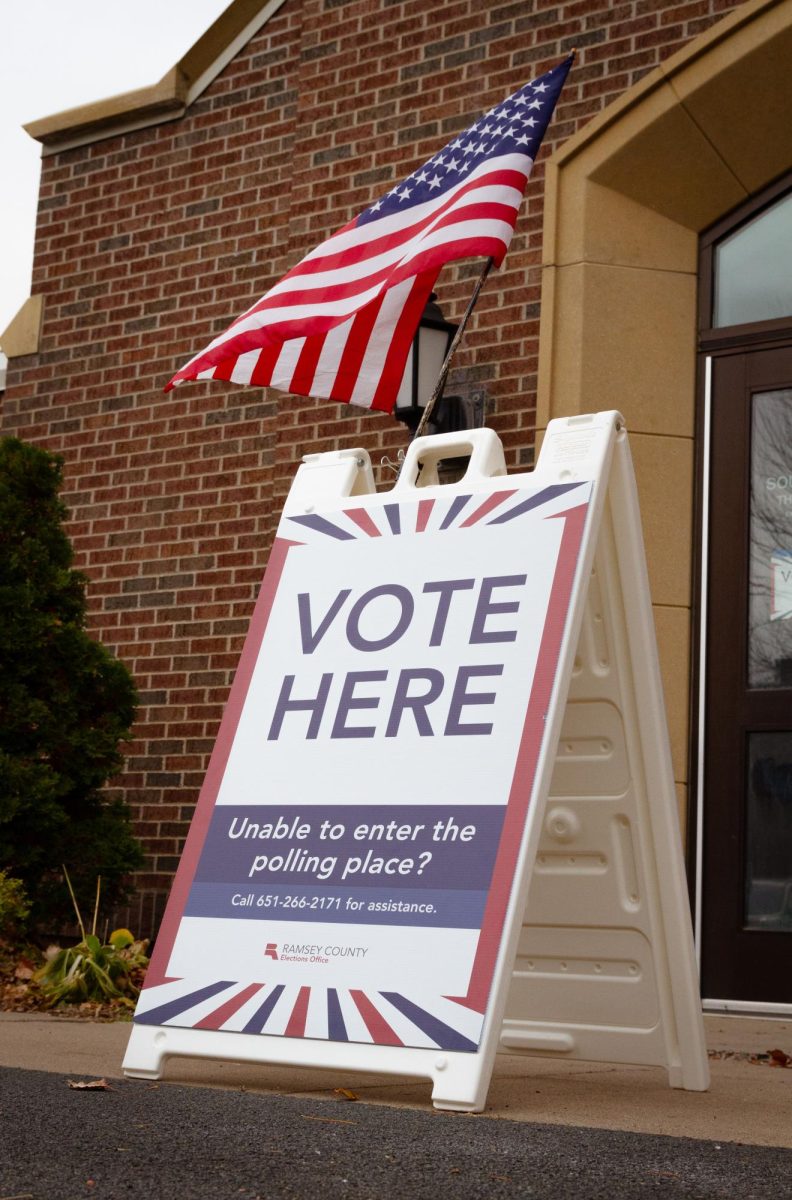Macalester students and other Ward 3 residents cast their ballots on Tuesday Nov. 7, helping to elect St. Paul’s most racially diverse City Council ever, and potentially its first all-female City Council. Voters also approved a sales tax increase to fund city infrastructure and ousted an incumbent on the St. Paul school board.
City Council
Students voting with their on-campus address, as well as some off-campus students, are part of St. Paul’s Ward 3, which elected Saura Jost to the City Council. Jost, who received 48% of the vote (6390 votes), won when her second-place opponent Isaac Russell (30 percent, 3987 votes) conceded the race on Tuesday night. Patty Hartmann got 19 percent (2562 votes) and Troy Barksdale ’23 received 2 percent (210 votes).
Jost plans to wield her background in civil engineering to “enginee[r] a vision of Saint Paul that raises us all up, includes everyone, and lasts us for the long haul,” as written on her website. Specifically, her priorities include affordable housing, reliable and clean transportation and environmental protection.
Jost plans to increase affordable housing, help people buying their first home and support mixed-family residential housing and tenant protections.
In terms of public transportation and infrastructure, Jost plans to both improve infrastructure and divert residents to more sustainable methods of transportation. She also wants to build new, innovative buildings, renovate historic buildings and expand access to green space. This ties into her climate goals: to be more forward thinking when it comes to the climate crisis, including through construction and infrastructure.
Jost’s other priorities include childcare and early childhood education, public safety for all, thriving and diverse businesses and engagement with community. The councilmember-elect has received solid support from the Ward 3 community, including from Macalester’s Sunrise Twin Cities, which endorsed her candidacy.
Jost’s opponent Isaac Russell released a concession statement on Tuesday night.
“While we don’t agree on several issues, it is important that our community moves forward together,” Russell said. “Her success is Ward 3’s and St. Paul’s success.”
In St. Paul’s Ward 4 — which contains many Macalester students who live north of Summit Avenue — incumbent councilmember Mitra Jalali, who was first elected to the city council in 2018, won with 79 percent of the vote (7,058 votes), while challenger Robert Bushard received 19 percent of the votes (1,674 votes.
In an editorial published in the Pioneer Press two days before the election, Jalali wrote about her vision for policies including investments in climate-friendly transportation infrastructure, increasing housing supply and rent stabilization, a “community-led public safety approach” and support for worker protections and labor unions. Jalali called it “dangerously wrong” to think that St. Paul “cannot focus on both strong basic services and ending historic inequities.”
Jost and Jalali are part of a group of left-leaning women of color who filed for their election campaigns together, including Anika Bowie (Ward 1), Hwa Jeong Kim (Ward 5) and Cheniqua Johnson (Ward 7). Kim also won her race. Meanwhile, Bowie and Johnson led their respective races based on first-choice votes, but under St. Paul’s ranked-choice voting system, neither candidate’s race had been decided as no candidate had received 50% of the first choice votes as of this article’s completion. If Bowie and Johnson uphold their leads and win their races, the St. Paul City Council would be all-female for the first time in city history.
Ballot Measure
St. Paul voters also passed the ballot measure, with margins of 60 percent to 40 percent. This measure will raise the city’s sales tax by one percentage point to raise $984 million over 20 years to improve infrastructure.
St. Paul’s streets had previously been projected to fall to an average rating of 29 out of 100 on a “pavement condition index,” according to the Pioneer Press.
75 percent of these funds raised by the sales tax increase will go to repairing 25 roads and bridges, but money will also go to parks, a multipurpose community center, an environmental learning space and other projects. Opponents of the measure say that the newly-established 9.875 percent sales tax will hurt restaurants and retailers that are already struggling through inflation and the effects of the pandemic.
School Board
In the St. Paul school board race, incumbent candidate Chauntyll Allen won, as well as three newcomers: Carlo Franco, Yusef Carrillo and Erica Valliant.
Carlo Franco, who led the field with 21 percent of the vote, works for St. Paul in Youth Engagement and participates in other community and youth-focused organizations. Franco’s platform prioritizes community decision making and investments in student support systems.
Incumbent Chauntyll Allen received the second-most votes, at 19 percent. A Rondo-born educator and community organizer, her platform includes increasing literacy to decrease incarceration, establishing universal pre-K, implementing trauma-informed mental health services, boosting educators’ salaries, funding technical education and listening to students about what they need.
Erica Valliant’s platform focused on financial literacy, safety and early education investments. Yusef Carrillo’s platform emphasized communication, transparency and student input. Valliant and Carrilo each received 17 percent of the vote.
Zuki Ellis, the other incumbent on the ballot, lost her seat with only 14 percent of votes as of Wednesday morning. Ellis, who has served on the School Board since 2015, ran on a platform emphasizing safe schools, special education, school funding and pandemic recovery. All four winning school board candidates were endorsed by the St. Paul Federation of Educators and the St. Paul DFL.
This reporting was based on election results as of Nov. 8.












